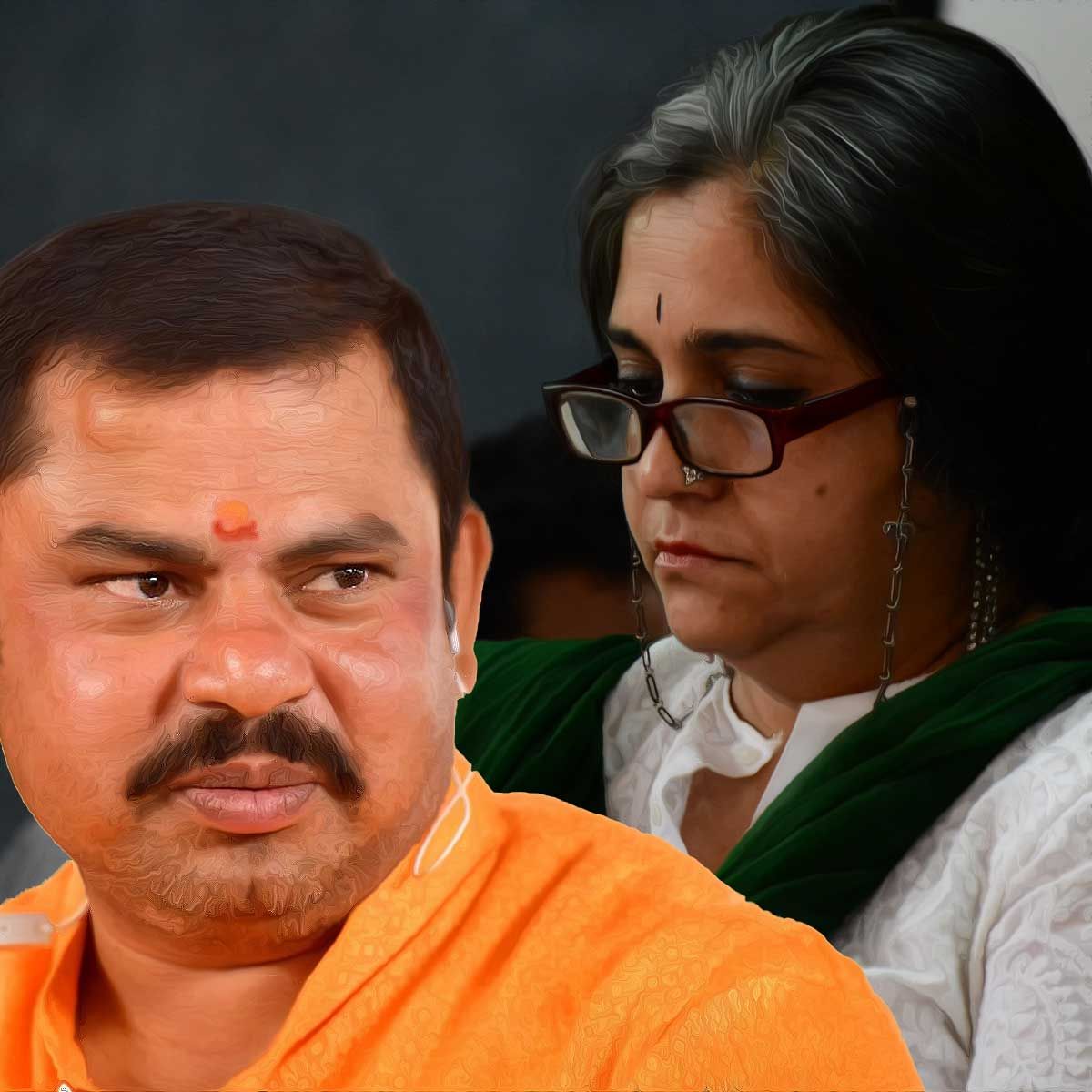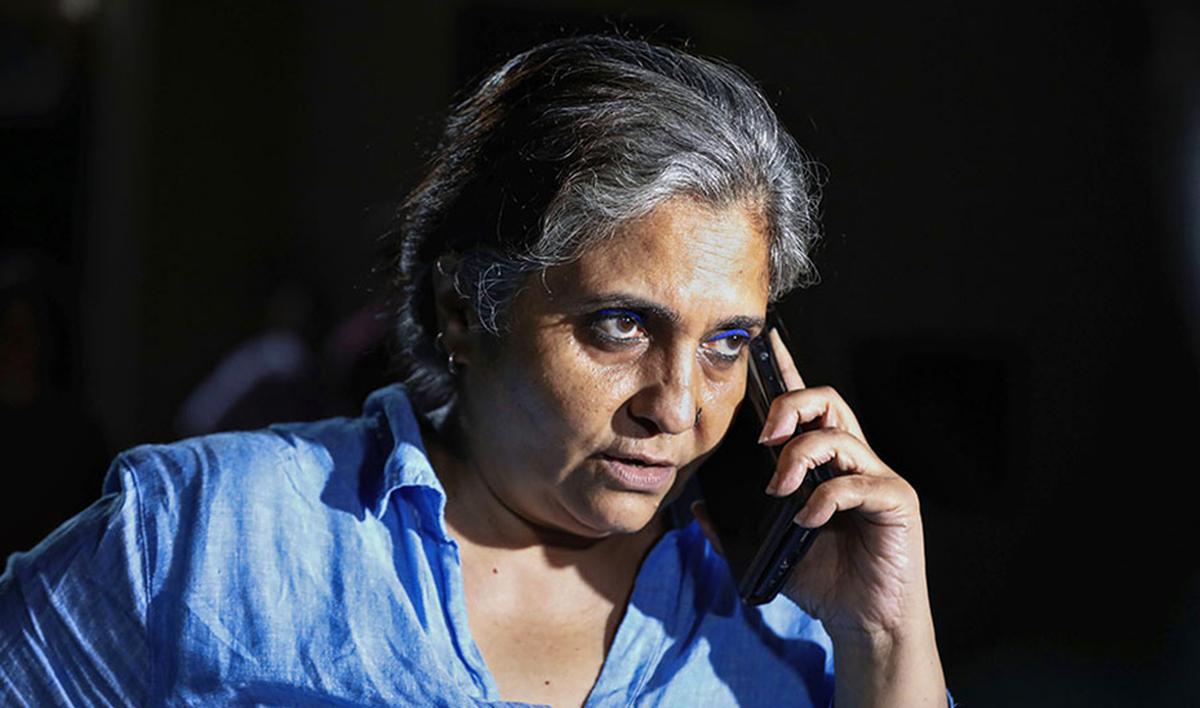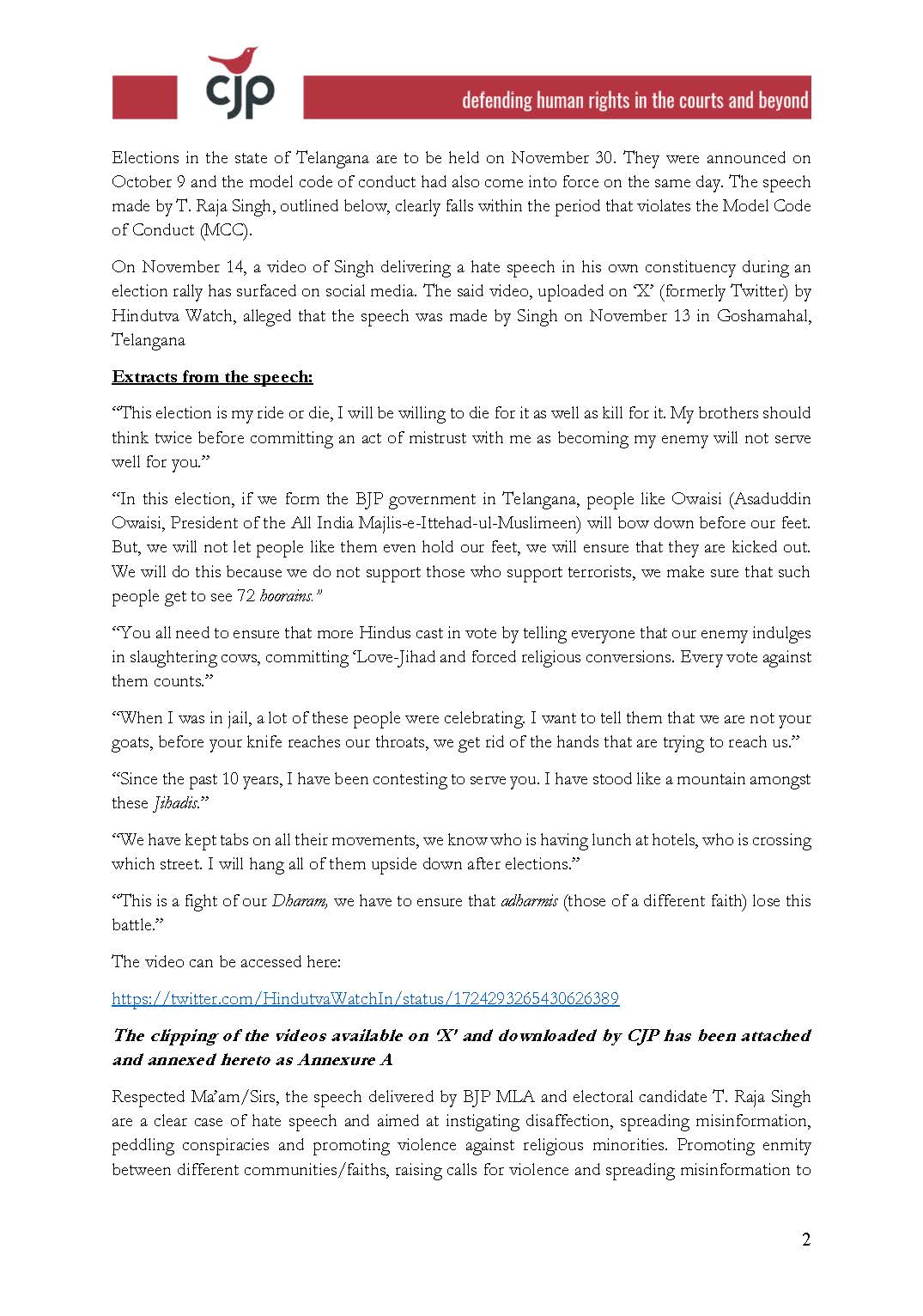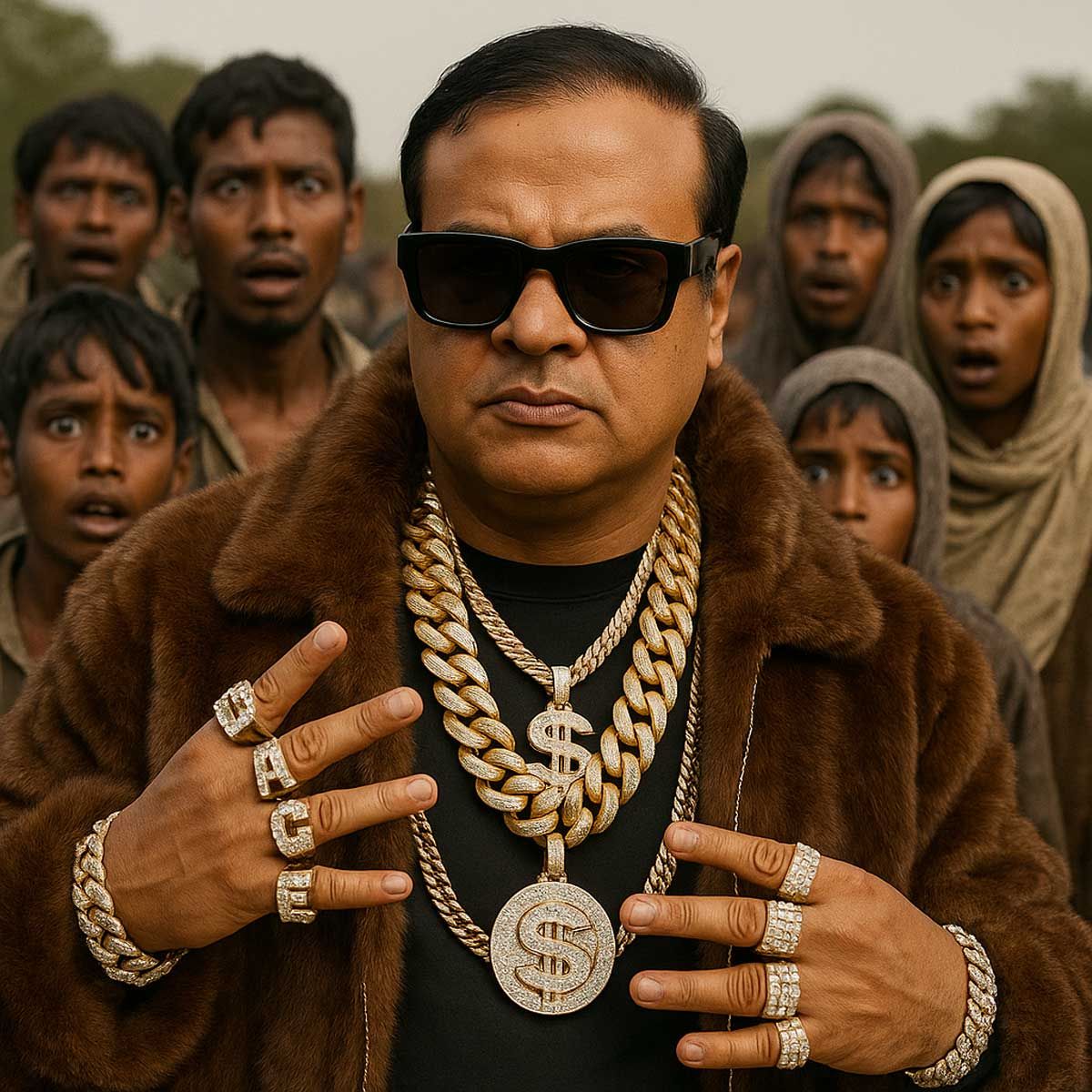More Coverage
Twitter Coverage
Satyaagrah
Written on
Satyaagrah
Written on
Satyaagrah
Written on
Satyaagrah
Written on
Satyaagrah
Written on
JOIN SATYAAGRAH SOCIAL MEDIA
"Chaos Connoisseur": Hindu activist & BJP leader Raja Singh stands strong amidst controversial attacks by Teesta Setalvad, with Telangana polls approaching, Setalvad complaint to the Election Commission sparks debate on political motivations and fairness

In the latest development stirring the political landscape, controversial ‘activist’ Teesta Setalvad has directed her focus towards Hindu activist and BJP leader T Raja Singh, especially with the Telangana polls on the horizon. Setalvad, a figure marred by allegations of fabricating evidence in cases linked to the 2002 Gujarat riots, is now pivoting her attention to the electoral domain.
|
The move by Setalvad comes at a critical juncture, as several states, including Telangana, are gearing up for elections. This shift in her focus raises questions about the timing and motivation behind her actions. The recent filing of a complaint with the Election Commission, facilitated through Citizens for Justice and Peace (CJP), marks a significant escalation in her activities against BJP leaders.
The complaint centers on BJP leader Tiger Raja Singh, known for his staunch Hindu activism. Setalvad's accusation? That Singh delivered a hate speech against the minority community, a claim that, if proven, could have far-reaching implications in the politically charged atmosphere of Telangana's upcoming elections.
This development opens up a plethora of questions and considerations. The nature of the alleged hate speech, the evidence supporting Setalvad's claim, and the impact such allegations could have on the electoral prospects of the BJP in Telangana are all points of significant interest and concern. Moreover, the role of the Election Commission in adjudicating this complaint will be closely watched, as it could set a precedent for how similar complaints are handled in the future.
This incident also casts a spotlight on the role of activists like Setalvad in Indian politics. While activism is an essential part of a vibrant democracy, the line between activism and political maneuvering can sometimes blur, especially in the heated run-up to elections. The controversy surrounding Setalvad adds another layer to this complex dynamic, making it a story that resonates beyond the immediate context of the Telangana elections.
|
In a detailed complaint to the Election Commission, the Citizens for Justice and Peace (CJP) has alleged that BJP leader Tiger Raja Singh engaged in hate speech during a recent election rally in his Goshamahal constituency in Telangana. The complaint, dated 14th November, specifically references Singh's speech from 13th November, which is now at the center of this brewing controversy.
The crux of the complaint lies in Singh's words during the rally, where he reportedly urged the Hindu community to unite against what he described as threats to their faith. Singh is quoted as saying, “You all need to ensure that more Hindus cast their votes by telling everyone that our enemy indulges in slaughtering cows, committing ‘Love-Jihad and forced religious conversions. This is a fight of our Dharam, we have to ensure that adharmis lose this battle.” This statement, according to CJP, not only propagates a divisive narrative but also potentially incites communal tensions.
The CJP's complaint elaborates that Singh's speech was designed to "instigate disaffection, spread misinformation, peddle conspiracies, and promote violence against religious minorities." This accusation, if validated, paints a disturbing picture of the electoral tactics being employed. The allegation that Singh indulged in corrupt practices by promoting enmity between different communities to garner votes is particularly troubling, suggesting a strategy of winning electoral support through division and fear.
This situation, as presented by the CJP, poses several critical questions about the nature of political discourse in India, especially during elections. The impact of such speeches on the social fabric, the potential for inciting communal violence, and the role of political leaders in safeguarding communal harmony are all points of concern.
|
Furthermore, the Election Commission's response to this complaint will be crucial. It will not only reflect on their stance against alleged hate speech but also set a tone for how such matters are dealt with in future electoral contests. The outcome of this complaint could therefore have implications far beyond the immediate political fortunes of Singh and the BJP, potentially influencing the nature of election campaigning in India.
During the electoral campaign, BJP leader Tiger Raja Singh made strong statements that have become a focal point of recent controversy. He declared his readiness to lay down his life for the nation, asserting, "I am ready to die to serve the nation and would never support terrorists." This statement reflects Singh's commitment to national service and his staunch opposition to terrorism.
However, his remarks extended beyond this patriotic sentiment. Singh targeted Asaduddin Owaisi, president of the All India Majlis-e-Ittehad-ul-Muslimeen (AIMIM), accusing him of supporting terrorists and furthering an Islamist agenda. These remarks indicate Singh's confrontational stance against opposition leaders, particularly those he perceives as having contrary political or religious ideologies.
|
The Citizens for Justice and Peace (CJP), in their complaint, interpreted Singh's words as an attempt to 'target' Owaisi based on his religious identity. They argue that Singh used these statements to threaten and sway voters against Owaisi. This perspective portrays Singh's speech as not just a political critique but as a tool for religious polarization.
Adding complexity to this narrative is the role of 'Hindutva Watch'. This group posted an edited video of Singh’s speech from the electoral campaign. Known for its history of spreading fake news and defaming Hindus, Hindutva Watch has faced accusations and legal actions for its activities, including attempts to incite riots within Maharashtra. The involvement of such a group raises questions about the context and interpretation of Singh's speech, suggesting that the information reaching the public may be influenced by agendas aimed at stirring controversy and discord.
This situation thus presents multiple layers of political and communal dynamics. On one hand, there is Singh's emphatic statement of nationalism and his critique of opposition leaders. On the other, there are accusations of religious targeting and the involvement of a group with a questionable reputation. These elements combine to create a complex and contentious scenario that reflects the challenges of political discourse in a diverse and often polarized society.
| CJP approaches Election Commission against the contentious conduct of BJP MLA T Raja Singh again! |
In a significant turn of events surrounding the electoral campaign in Telangana, the group Hindutva Watch has accused BJP leader T Raja Singh of delivering a "hate and conspiracy theories-filled speech against Muslims with overt threats of violence at an election rally." This allegation was accompanied by the posting of an edited clip of Singh’s speech on Twitter, a move that has sparked controversy and debate.
The gravity of these accusations is compounded by the fact that the Citizens for Justice and Peace (CJP) based their complaint to the Election Commission on this very video. The CJP has charged that Singh's speech, as depicted in the video, violates the secular and democratic values enshrined in the Indian Constitution, specifically pointing out breaches in equality and non-discrimination provisions. Furthermore, the CJP argues that Singh’s actions constitute “corrupt practices” under the Representation of the People Act, 1951.
What adds a layer of complexity to this situation is the reputation of Hindutva Watch. Known for its history of spreading fake news and defaming Hindus, the credibility of the video and the context it provides for Singh’s speech are called into question. This raises important issues about the reliability of sources in the digital age, especially when such serious accusations are being made.
The CJP's complaint, filed after the Model Code of Conduct (MCC) came into effect on October 9, details specific violations allegedly committed by Singh under the MCC’s guidelines. These accusations, if proven true, could have significant implications for Singh and the BJP, particularly in terms of their adherence to electoral regulations and ethical campaigning practices.
|
The unfolding of this scenario is a critical test for the Election Commission, as it navigates the complex interplay of political rhetoric, media representation, and legal guidelines. The Commission's response to this complaint will not only impact Singh’s political career and the BJP's electoral prospects but will also set a precedent for how similar cases are handled in the future.
As this case progresses, it underscores the challenges facing democratic institutions in ensuring fair and ethical electoral practices, especially in an era where digital media can both illuminate and distort political discourse. The outcome of this complaint will be closely watched, as it holds implications for the nature of political campaigning, the role of social media in shaping public opinion, and the robustness of India’s democratic processes.
In a development that adds another dimension to the controversy surrounding BJP leader T Raja Singh, Twitter took action against the video posted by Hindutva Watch. The social media platform, acting on a notice from the Hyderabad Cyber Crime Police Station, informed Hindutva Watch that the content in the video violated Indian laws and requested its removal. Despite this, the video reportedly remains accessible on Hindutva Watch's Twitter handle.
|
This intervention by Twitter underscores the complexities of regulating content on social media, especially when it involves politically sensitive material. The decision to flag the video for legal non-compliance highlights the challenges platforms face in balancing freedom of expression with adherence to local laws and regulations. It also raises questions about the efficacy of content moderation policies and their implementation, particularly in the context of heated political discourse.
Meanwhile, the Citizens for Justice and Peace (CJP), a society registered under the Societies Registration Act, 1860, and as a Trust under the Bombay Public Trusts Act, 1950, has been actively bringing attention to instances of ‘Hate Speech’. Established on April 1, 2002, and led by President Nandan Maluste and Secretary Teesta Setalvad, the CJP’s involvement in this case is notable for its reliance on the controversial video posted by Hindutva Watch. The CJP’s decision to base its complaint on a video from a source with a history of spreading fake news and inciting hate against Hindus presents a paradox. This reliance brings into question the standards of evidence and source credibility in the process of lodging formal complaints.
In a noteworthy development in the unfolding political drama in Telangana, BJP leader T Raja Singh faces another complaint for allegedly promoting enmity between different classes. This complaint, filed on 14th November, has led to the registration of a suo moto case under Section 125 of the Representation of the Public Act 1951, which deals with promoting enmity between classes in connection with an election.
|
|
This new complaint stems from a speech given by Singh on 14th November at a community hall in Maharajgunj. The police, upon reviewing the video clip of the speech, decided to file the case suo motu, indicating that they took action on their own accord without the need for an external complaint. This action by the police signifies the seriousness of the allegations, suggesting that Singh’s speech contained elements deemed sufficiently inflammatory to warrant legal scrutiny.
The allegation that Singh targeted a specific community in his speech adds to the already charged atmosphere surrounding the upcoming elections in Telangana, scheduled for November 30. Such accusations, especially when they involve the potential for inciting communal discord, are particularly sensitive in the context of Indian politics, where communal harmony is often a delicate balance.
 |
| Teesta Setalvad |
The implications of these developments are significant. For Raja Singh, these allegations and the ensuing legal actions could have serious ramifications for his political career and public image. For the BJP, these events could impact their electoral prospects in Telangana, potentially influencing voter perceptions and party reputation.
More broadly, these incidents highlight the challenges faced in maintaining civil and inclusive political discourse, especially during the high-stakes period of electoral campaigning. They underscore the need for political leaders to exercise caution and responsibility in their public communications, particularly when addressing sensitive topics such as community relations.
 |
| Screenshot from a complaint by CJP to the election commission |
 Support Us
Support Us
Satyagraha was born from the heart of our land, with an undying aim to unveil the true essence of Bharat. It seeks to illuminate the hidden tales of our valiant freedom fighters and the rich chronicles that haven't yet sung their complete melody in the mainstream.
While platforms like NDTV and 'The Wire' effortlessly garner funds under the banner of safeguarding democracy, we at Satyagraha walk a different path. Our strength and resonance come from you. In this journey to weave a stronger Bharat, every little contribution amplifies our voice. Let's come together, contribute as you can, and champion the true spirit of our nation.
 |  |  |
| ICICI Bank of Satyaagrah | Razorpay Bank of Satyaagrah | PayPal Bank of Satyaagrah - For International Payments |
If all above doesn't work, then try the LINK below:
Please share the article on other platforms
DISCLAIMER: The author is solely responsible for the views expressed in this article. The author carries the responsibility for citing and/or licensing of images utilized within the text. The website also frequently uses non-commercial images for representational purposes only in line with the article. We are not responsible for the authenticity of such images. If some images have a copyright issue, we request the person/entity to contact us at This email address is being protected from spambots. You need JavaScript enabled to view it. and we will take the necessary actions to resolve the issue.
Related Articles
- New York Times receives a befitting reply from India over its report alleging India is stalling WHO’s efforts to make global Covid death toll public: Also asked NYT why it was unable to learn the estimates of other countries
- Vinayak Damodar Savarkar – A Misunderstood Legacy
- "Fraud and falsehood only dread examination. Truth invites it": DMK Minister Senthil Balaji rolls around & cries uncontrollably of chest pain when taken into custody on corruption charges by ED, he is 2nd most powerful man & money bank of the ruling party
- How new political ensemble of 'farmer' groups is one of the best news in recent times
- Propagandists spread hue and cry after PM's new Mercedes Maybach which is a routine replacement, but hushed on Sonia Gandhi using Range Rovers procured for the then PM
- "People who values its privileges above its principles soon loses both": U20 World Championship winner Antim Panghal moves court to challenge Vinesh Phogat’s direct selection to Asian Games, Vishal Kaliraman also opposes free pass to Bajrang Punia
- Was Indira Gandhi a Soviet Agent - 100 Years of Russian Revolution
- Truth of Rahul Gandhi at Cambridge University event to speak at “India at 75": Organised by Congress affiliate organisation “Bridge India”, partner outfit stuffed with Congress leaders, Oxfam and Amnesty connections
- Indira Gandhi’s bahu published intimate photos of Jagjivan Ram’s son in her magazine: This 'Saas-Bahu ki Saajish' mothered India’s first major political sex scandal which cost Jagjivan his political career
- Delhi court denies interim bail to BRS leader K Kavitha in a high-profile liquor policy scam, stating 'prima facie involvement'; emphasizes her active role in offences, including evidence destruction & influencing witnesses, underscoring the case gravity
- Questioning the very idea of India as a ‘nation’, stoking sub-nationalism, and launching a tirade against the Modi government – Shehjada Rahul Gandhi’s new playbook of polarisation
- "A guilty soul shouts in whispers": In a dramatic legal twist, Cash for queries scam takes a startling turn as TMC's Mahua Moitra withdraws her defamation case against media amidst allegations, setting the stage for a high-stakes political showdown
- Same Congress which is offering freebies in the states during polls has not paid rent for Lutyens Delhi bungalows for almost a decade, Rent worth crores pending: RTI revelation
- Jawaharlal Nehru University A Centre Of Excellence, But It Must Get Rid Of The Anti-National Forces: JNU at At A Dangerous Inflection Point
- "Honesty stands at the gate and knocks, and bribery enters in": Prashanth Kumar, chief accounts officer of Bangalore Water Supply & Sewerage Board arrested for ₹40 Lakh Bribe from office of Karnataka Soaps and Detergents Ltd, of brand Mysore Sandal Soap




























